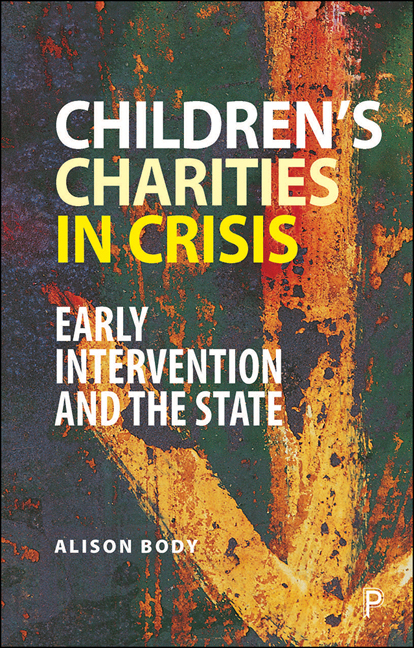Book contents
- Frontmatter
- Dedication
- Epigraph
- Contents
- List of Figures and Tables
- About the Author
- Acknowledgements
- Introduction
- Part I Preventative Services and Children’s Charities: Policy and Paradigm Shifts
- Part II On the Frontline of Early Intervention
- Part III The Lived Realities of Commissioning Children’s Early Intervention Services
- Part IV Concluding Thoughts
- Appendix: Data and Methods: Voices from the Frontline
- References
- Index
1 - New Labour, Children’s Services and the Third Sector
Published online by Cambridge University Press: 04 March 2021
- Frontmatter
- Dedication
- Epigraph
- Contents
- List of Figures and Tables
- About the Author
- Acknowledgements
- Introduction
- Part I Preventative Services and Children’s Charities: Policy and Paradigm Shifts
- Part II On the Frontline of Early Intervention
- Part III The Lived Realities of Commissioning Children’s Early Intervention Services
- Part IV Concluding Thoughts
- Appendix: Data and Methods: Voices from the Frontline
- References
- Index
Summary
This chapter provides an overview of the concept of prevention within child welfare, particularly under the New Labour government (1997– 2010). Coming to power in 1997, New Labour placed considerable focus, and financial investment, on reducing child poverty and social exclusion, and increasing universal early intervention support and coordination between services. The role of the voluntary sector became mainstream in the provision of children's services, with the launch of several high-profile initiatives such as Sure Start, the Children's Fund and the Connexions service.
In this chapter we demonstrate that social policy encapsulates child welfare from several alternative perspectives, often corresponding to whatever the current dominant social conceptualisation of childhood and the welfare state may be within that period (Hardiker et al, 1989; 1991). Focusing on the concept of ‘prevention’ within child welfare and building on these shifting understandings of childhood, and the concerns for children, this chapter explores how social policy operationalised under the Labour government, developed strategies to tackle issues surrounding children and young people who are considered disadvantaged, vulnerable or at risk and mobilised the voluntary sector within this response.
Every Child Matters
Following on from the Children Act 1989, the Every Child Matters Green Paper (DfES, 2003) and the Children Act 2004 enshrined in law a commitment for state intervention in the private realm of the family. The Green Paper covered three principal themes: early intervention and effective prevention, supporting parents and carers, and accountability, integration and workforce reform. Furthermore, it articulated five outcomes that all children should achieve – being healthy, staying safe, enjoying life and achieving, making a positive contribution, and achieving economic wellbeing. With the aim of improving the wellbeing of all children, this paper set out the requirement for agencies and services to work together, share information effectively and in turn provide evidence against a set of performance indicators. The Every Child Matters Green Paper (DfES, 2003) and the following Every Child Matters: Change for children (DfES, 2004) were built upon evidence suggesting that early intervention would have the best outcomes and most positive impact for the life chances of children, highlighting the need for preventative services.
- Type
- Chapter
- Information
- Children's Charities in CrisisEarly Intervention and the State, pp. 17 - 34Publisher: Bristol University PressPrint publication year: 2020



